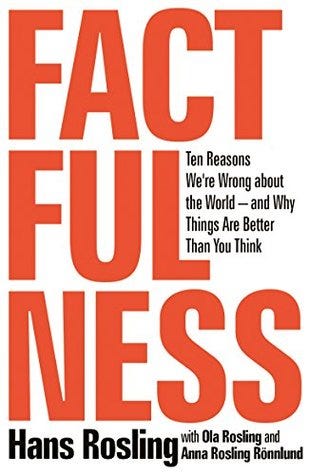Title: Insightful Reflections on Factfulness by Hans Rosling
Written on
Chapter 1: Overview of Factfulness
Hans Rosling’s Factfulness: Ten Reasons We’re Wrong About the World — and Why Things Are Better Than You Think, co-authored with Anna Rosling Rönnlund and Ola Rosling, is a compelling read that delivers significant insights in a digestible format. It has received a rating of 4.3/5 stars on Goodreads, indicating its popularity and impact.
In this book, Rosling distills a lifetime of knowledge acquired from his experiences as a physician and statistician. He shares pivotal conclusions drawn from years of advocating for a fact-based worldview, addressing why many individuals—including highly educated experts—often perform worse than chance on factual questions concerning global issues.
Section 1.1: Misconceptions About the World
Factfulness revolves around a series of questions posed to various global audiences, including leaders, scientists, and politicians. Alarmingly, most respondents answer incorrectly. For instance, consider the question:
How many of the world’s 1-year-old children today have been vaccinated against some disease?
- A: 20 percent
- B: 50 percent
- C: 80 percent
The book leverages these misunderstandings to explore ten instincts (or biases) that mislead our perceptions of the modern world. Each chapter is dedicated to one instinct, illustrating how our views can be skewed, ultimately revealing that the state of the world is more positive than we often believe. Each chapter concludes with guidance on avoiding misjudgments stemming from these biases.
Subsection 1.1.1: Common Instincts and Their Impacts

For example, the Gap Instinct leads us to perceive two distinct groups separated by a gap. In actuality, most individuals fall into a middle ground, where the perceived gap is often exaggerated—akin to a bell curve.
Another instance is the Straight Line Instinct, where there's a tendency to assume that trends will continue in a straight trajectory. In reality, many trends, such as population growth, are more complex and are beginning to level off, projected to plateau by the year 2100.
Section 1.2: A Comparative Read
In its exploration of these instincts, Factfulness serves as a more accessible alternative to Daniel Kahneman’s Thinking, Fast and Slow. Whether you've enjoyed Kahneman's work or found it challenging, Factfulness could provide a refreshing and enlightening experience.
Chapter 2: Key Takeaways
In conclusion, if you're still curious, the correct answer to the vaccination question is C: 80 percent of the world’s 1-year-old children have received vaccinations against at least one disease.
The first video, "Factfulness by Hans Rosling | Book Review," offers an insightful overview of the book's main themes and ideas.
The second video, "Factfulness by Hans Rosling Book Recommendation," further discusses the relevance and importance of the book in today’s context.
You might also enjoy:
- 3 Essential Books on the History of Computing
- 3 Engaging Non-Fiction Reads to Broaden Your Perspective